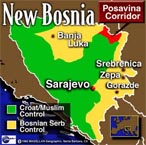Fractured Bosnia faces new crossroads on EU path
 Sarajevo - With closer ties to the European Union at stake, Bosnia's squabbling politicians face international pressure to pass a long-delayed reform of the country's splintered police forces.
Sarajevo - With closer ties to the European Union at stake, Bosnia's squabbling politicians face international pressure to pass a long-delayed reform of the country's splintered police forces.
But even if the Sarajevo parliament approves the new laws in a vote expected Thursday, that would only signal a small compromise that papers over the Balkan country's divisions.
After more than four years of discussion, the proposals would bolster the central government's police powers. Yet the regional police forces controlled by authorities of the two ethnic areas - the Muslim-Croat federation and the Bosnian Serb republic - would remain intact.
The international administrator in Bosnia, Slovak diplomat Miroslav Lajcak, has warned local politicians for months that only a police reform will clear the way for a Stabilization and Association Agreement (SAA) with the EU, a first step toward possible membership.
"Ordinary people want to see development, closer social and business ties with the EU, they want the visa regime liberalized," said Lajcak, calling EU integration Bosnia's "most important strategic objective." .
But Bosnia's leading politicians have bickered over technicalities in the draft laws that indicate a larger power struggle.
Haris Silajdzic, leader of the largest Muslim party and current head of Bosnia's three-member presidency, hints that he wants the reform to be just the first step toward a police force controlled by the central government.
Milorad Dodik, the Bosnian Serb prime minister, vows that the Serbs will never give up their police.
Some veteran Bosnia watchers say the police-reform saga masks a lack of options for the EU.
"It is purely cosmetic window-dressing legislation to make the EU feel happy," said James Lyon, a Balkans analysts at International Crisis Group, a Brussels-based think tank.
Many Bosnians are equally disillusioned about the future of their largely divided country, where Slavic Muslims make up 48 per cent of the population, Serbs 34 per cent and Croats 15 per cent.
The United States, which brokered the 1995 Dayton peace agreement that ended Bosnia's three-and-a-half-year ethnic war, has urged local politicians to see the bigger picture and adopt the police reform.
"A compromise about this issue is possible," the daily Dnevni avaz quoted US ambassador Charles English as saying. "The differences are in a few words now. Those words are not unimportant, but everything is possible with political will." (dpa)